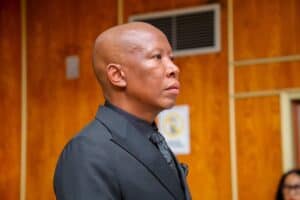The NPA instituted charges against Malema under the same section of the Riot Act contested in court, for telling supporters to occupy land.

EFF leader Julius Malema is gunning for a defence in his criminal trial by bringing an application to the Constitutional Court to declare sections of the Riotous Assembly Act unconstitutional.
This according to the respondents in the application, the justice and correctional services minister and National Prosecuting Authority (NPA), which was heard on Tuesday.
Michael Osborn, who represents the respondents, argued it appeared Malema and the EFF were arguing the party leader should escape punishment because “no underlying crime causally linked to his utterances can be proven”.
The case Osborn speaks of stems back to 2014 and 2016 when Malema called on people to occupy vacant land. The NPA, which is also a respondent in this case, instituted charges against him under the same section of the Riot Act contested in court.
The EFF and Malema then approached the high court to set aside the NPA’s decision to prosecute Malema. They also sought to declare this section of the Riot Act unconstitutional and to re-interpret the Trespass Act to mean that it is no longer a crime.
“One of the facts the court should take into account in deciding whether or not to grant leave to appeal and … we’re not pushing this abstract point [but] perhaps Malema [should] go to trial first even after the high court made its order, it might have been helpful,” Osborn said.
But Tembeka Ngcukaitobi SC, on behalf of the EFF and Malema, maintained the application was not about Malema, but about free speech.
“The problem is not that there will be no defence when Mr Malema goes to trial, the problem is that the chilling effect on (free) speech is the prospect of being charged,” he said.
“The problem, as Mr Malema points out in his founding affidavit before the high court, is that the incitement provisions were specifically designed to deal and to catch the instigators. These were statutes and provisions specifically designed for Mr [Nelson] Mandela,” Ngcukaitobi added.
In papers, the respondents argued the case before the Constitutional Court, in essence, questioned whether a political leader who urged followers to take part in “unlawful land invasion” and was then charged with incitement, could claim the protection of free speech.
While Ngcukaitobi, argued Section 18(2)(b) of the Riot Act criminalised free expression, it was protected in Section 16 of the Constitution.
But according to the respondents: “The authors of the leading constitutional text list the values served by free expression as [the] facilitation of the democratic process; self-fulfilment and the search for truth.
“None of these values are served by the words alleged to have been uttered. They do not constitute a claim to ‘truth’. They form no part in deliberative democracy. And the goal of ‘self-fulfilment’ is in no manner served by urging mass land invasion.
“There is nothing to stop Mr Malema and the EFF from passionately advocating radical land reform, including expropriation without compensation. They are free to mobilise and march for the cause. What they may not do is consciously and with direct intent rouse followers to take action,” Osborn said.
For more news your way, download The Citizen’s app for iOS and Android.
Support Local Journalism
Add The Citizen as a Preferred Source on Google and follow us on Google News to see more of our trusted reporting in Google News and Top Stories.








